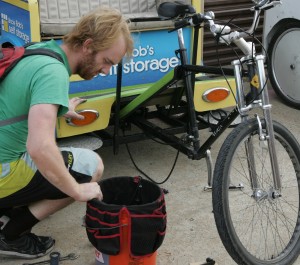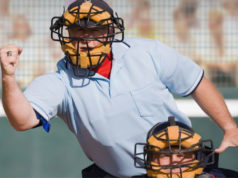6:45 p.m.
“E-A-G-L-E-S, Eagles!” cries John Pezzano from his pedicab seat. Wearing a Philadelphia Eagles jersey and a matching green-and-white Santa hat, he’s able to raise hell among the like-minded fans he passes (by far the minority) from the comfort of a moving leather seat.

When he and his lady friend pay up, a little miffed by the $20 fare, she ends up dishing out the cash and tells Pezzano the ride is his birthday present.
“This is my birthday present? Staring at a guy’s ass for 10 minutes?” he says.
The couple’s surprise at the cost is more than a little feigned. After all, most pedicabbers working that night agree on a price with their customers at the start of the ride. They also never take the money up front –– tips, it turns out, are always better at the end of the ride, when the passengers realize the exertion required to tow 500 to 1,000 pounds using a single bicycle gear.
The City of Arlington allows open containers in the area around Rangers and Cowboys stadiums, to accommodate tailgaters and general sports fan debauchery. That means said fans often climb/fall into pedicab seats with a red cup and a cigarette, shouting out to fellow revelers as the cab snails along among tailgate parties and other football pilgrims.
Surprisingly, pedicabbers give high marks to Arlington, even compared to that hippie-dippie liberal bastion down south. Downtown Austin has been home to pedicabbers for a decade, but pedicab business owners say Arlington officials and police have actually done a better job of managing the burgeoning industry.
When pedicabbers first started showing up at Cowboys Stadium, they often brought homemade pedicabs constructed from scrap metal and spare parts, lacking tail lights or even brakes. It was every cabbie for himself (or herself) in a flooded market, and the free-for-all didn’t seem like such a good idea.
“When it first started, it was a rodeo out there,” said Steve Cooke, assistant director for the city’s transportation department.
In 2009 the city passed its first pedicab ordinance, requiring vehicle inspections, drug tests for drivers, and a cap of 40 pedicabs operating during a given event. In early 2012, the transportation department worked with the pedicab business owners to make revisions, allowing the cabs access to a few more streets during certain hours and rewarding good behavior: Pedicab companies that haven’t drawn any citations are assured of being able to operate without having to go through the annual lottery for such permits.
However, it’s not all hugs and kisses between the city and its pedicabbers. Seidenberg wants permission for his drivers to use Randol Mill Road, a busy thoroughfare in front of the stadium that could mean more fares from people leaving by the arena’s west exit.
Keith Melton, another assistant director at the city’s transportation department, said that isn’t going to happen. It’s a busy road at any time, and there’s no way to manage both trucks and pedicabs without a great deal of risk, he said.
“Texans don’t stop for pedestrians; they’re not going to stop for bicycles,” Melton said. “I don’t know why these operators would want them on these roadways. It’s a huge safety issue.”
Which is not to say that Melton and Cooke dislike pedicabs in general. Both said the pedal-powered vehicles provide a needed service to the city’s sports-loving visitors. More than that, it “enriches the texture in Arlington,” city spokesperson Rebecca Rodriguez said. “It fits with the changes to downtown.”
7:07 p.m.
“10! 9! 8! 7! 6! 5! 4! 3! 2! 1!
“WHOOT!”
As the Dallas Cowboys enter the field to familiar fanfare, the game’s announcer is audible all the way to the street corner opposite the stadium, where stragglers haul ass to make it inside before the game starts.
Four guys jump out of a pedicab, late for the game and unwilling to waste time talking to a reporter. One of them manages to dictate a phone number before running across the street. “Call us later, dude!”
A family of three pays their fare as quickly as possible. “Get ready to run!” the mom says to her 6-year-old. Everywhere you look, it’s an absolute rush.
Well, almost everywhere.
Standing in the middle of the strip of orange cones on Legends Way, two obviously intoxicated white women, perhaps in their 30s or 40s, are lavishing quite a bit of attention on a young black pedicabber, who is not exactly beating them off with a stick. The three of them stand there together for at least 20 minutes as the women take photo after photo with their pink iPhones. “C’mon, do it again, I don’t want that on my profile!” one of the women says.
That’s before the ladies start trading not-so-timid kisses with their cabbie.
Like many kinds of nighttime entertainers and even taxi drivers, pedicabbers often have to deal with the advances of frisky customers. It’s one of the less glamorous parts of the job, at least for the women.
Brooke Moorman, a young Austinite, is uninterested in using her feminine wiles to finagle higher tips. She has enough trouble dealing with drunk, rambunctious men as it is.
The male drivers, however, take a different tack.
When it comes to playful female passengers, Jesse and Joel Garcia, two brothers in pedicabbing, are self-described flirts, quite willing to follow the lead of the boundary-pushing coquettes sitting behind them.
An interested female rider will sometimes hand over her digits, an offer that Jesse, at least, has actually followed up on. Joel’s favorite example is the woman who kept making kitten noises at him the entire ride.
“I call her the meow girl,” he said.
Generally, the brothers know it’s just smart business strategy to show everyone a good time.
“I always tell them that touching costs $5,” Jesse said. “Usually I just end up letting them touch me for free.”











Maybe I don’t read journalism very much, but this article seemed better written than what I’m accustomed to. Bravo.